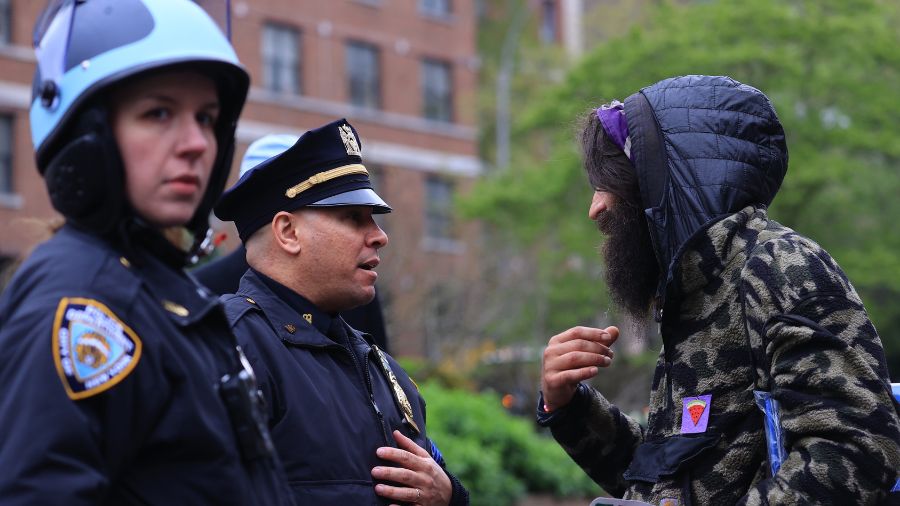Rantz: WA schools adopt race-based discipline, white students to get harsher punishment
Mar 21, 2022, 6:00 PM | Updated: Mar 23, 2022, 2:49 pm
A Washington school board butted heads over a new student discipline policy that considers a student’s race before deciding on a punishment.
The Clover Park School District debated its new “culturally responsive” student discipline policy. It means student discipline would not be consistent based on conduct. Instead, a school considers a student’s race and background. It would likely offer harsher punishments to white students, even if the conduct is identical to that of a Black or Hispanic student.
The disparate treatment is championed in the name of inclusion. But it’s not just a Clover Park School District controversy.
The culturally responsive policy impacts every Washington school district after Democrats passed a law institutionalizing critical race theory in student discipline.
One WA school district is implementing a student discipline policy that takes race into account before doling out punishment. It’s intentional — and going statewide. I stopped by @FoxBusiness to discuss it on @Varneyco! pic.twitter.com/pflEl9fWrx
— Jason Rantz on KTTH Radio (@jasonrantz) March 23, 2022
Culturally responsive discipline gets support
The Clover Park School Board adopted a revised student discipline policy at its March 14 meeting by a vote of 3-2. At times, the meeting was contentious as two board members argued it’s wrong to use race to determine punishment. The district is majority-minority, with 28% white students.
According to the policy, disruptive students may face “exclusionary as well as positive and supportive forms of discipline.” But the focus, the policy maintains, is to keep students in the classroom and provide “equitable educational opportunities.”
To make student discipline outcomes more “equitable,” the policy must meet “individual student needs in a culturally responsive manner” via “culturally responsive discipline.”
The state officially defines “culturally responsive” as “knowledge of student cultural histories and contexts, as well as family norms and values in different cultures; knowledge and skills in accessing community resources and community and parent outreach; and skills in adapting instruction to students’ experiences and identifying cultural contexts for individual students.”
In practice, it means favorable treatment of racial minorities.
Rantz: Teacher disciplined for disturbingly sexual comment to young student
Race-based discipline
The two conservative members of the Clover Park School Board asked what is meant by the term “culturally responsive discipline.” Deputy Superintendent Brian Laubach attempted to explain.
“Essentially they’re referring there, that you look at ‘are you dispersing discipline across the ethnicities, the racial groups equitably,’ right?,” Laubach said. “So, are you disciplining African-American boys more than you’re disciplining white boys, right? So, are you paying attention to all of that in your data?”
He continued by listing some specific data schools would need to compile on student discipline.
“What are their backgrounds? Ethnicity? That sort of thing can be commented in that way about it. Then, asking classroom teachers, asking administrators who dispense that discipline, you know, what brought that about over the other forms of discipline you used in your classroom to make a change happen before sending a kid out, perhaps, for a behavior violation,” Laubach said.
Conservative board member pushes back
Attempting to further explain the concept, board member Anthony Veliz offered a clumsy example of a student stealing a slice of pizza. Veliz argued that the student’s culture teaches that stealing is permitted.
“What if, you know, just saying, like, in my background, what if that type of rule that we broke was more acceptable at my house, right, versus your house?” Veliz said. “And, you know, when I’m talking to them, like, ‘hey, you know what, actually, I thought I was OK, I thought it was fine to grab that piece of pizza before anybody else. Because in my house, I’m allowed to do that.’ Right?”
Board member Paul Wagemann, meanwhile, rejected this concept.
“Let’s say we both commit the same offense,” Wagemann explained. “Then the question should be what are the consequences of that offense? And how do we go through that process? That’s how I see it. And to be fair, if we both did the same thing, we should get the same consequence, the way I see it. And I think that’s how most children on the playground like to see it. Most of us, as citizens in our community, like to see it that way. That it’s equal.”
Wagemann objected to the notion that he would “have to look at [a student’s] nationality or where he was born or where he lived” before punishment.
“He did an offense. I did the same offense. We should suffer the same consequence. And I think that’s what our system should do, at least the way I see it,” Wagemann concluded.
Rantz: School district says your baby is racist — their CRT propaganda will fix it
This is happening at all schools
It seems reasonable to consider why kids are acting out. We should, in fact, do everything we can to keep kids in the classroom rather than face suspension when it makes sense. But the framework that built this policy comes from the Washington state Legislature. And that’s why you should be worried.
Democrats passed a law implementing cultural competency standards and training for schools and school boards. The intent was to provide tools that will lead to “dismantling institutional racism in public schools.” If this sounds like language that would come from CRT evangelists, you’d be correct.
Now it’s infecting every school district in the state, as school boards are undergoing training so they can implement these policies.
The way to accomplish these progressive goals, as the Washington State School Directors’ Association notes, is by “supporting procedural and outcome fairness.” This means the outcomes must be the same.
The data currently shows Hispanic, white, and Black students receive the most student discipline. None of the data suggests disproportionate enforcement, relative to their demographic share of the student population.
But data doesn’t matter. Lazy progressive activists claim it’s racist to punish racial minorities because the presumption should be that those students are already oppressed. White people are deemed oppressors, so you should punish them because of their so-called privilege.
Washington educators told to focus on race
If a teacher thinks it might be fair to punish students the same way, regardless of racial identity, left-wing partisans claim it’s implicit bias. Educators are to view everything through a racial lens, as CRT instructs.
According to the Regional Education Laboratory’s (REL) Vicki Nishioka, teachers must lean into data on race when considering discipline. Looking at a REL study based on Oregon student discipline data, Nishioka implies all races should see relatively equal enforcement — regardless of trends in student conduct. That effectively means white, Black, and Hispanic students should see relatively equal disciplinary action, or there’s bias at work.
“Implicit bias can lead educators and students to interpret the same events in two different ways, especially when they do not share common lived experiences or cultural backgrounds,” Nishioka writes. “Schools can address this by helping educators build awareness of their own implicit biases and learn about their students’ cultural backgrounds and perspectives.”
In other words, to use the example from Veliz in the Clover Park School District, if a teacher thinks stealing pizza is wrong, it’s because of their own cultural backgrounds.
Listen to the Jason Rantz Show weekday afternoons from 3–6 pm on KTTH 770 AM (HD Radio 97.3 FM HD-Channel 3). Subscribe to the podcast here. Follow @JasonRantz on Twitter, Instagram, and Facebook. Check back frequently for more news and analysis.


















